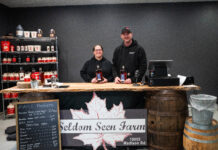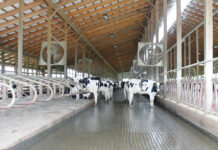
LEETONIA, Ohio — On a dreary Thursday evening, the clouds finally parted and rain had finally stopped as people made their way to Todd Miller’s farm, Farmboy Cattle, in Columbiana County, Ohio for a pasture walk.
After gathering under his pen pack, Miller led the crowd of interested onlookers past his herd of cows and through his grass fields to explain the different resources and conservation techniques he has adapted to using over the years.
Miller and his family were among one of five families to receive the 2023 Conservation Farm Family Award from the Ohio Department of Agriculture at the Farm Science Review, held Sept. 19 to 21.
“We’re able to run more cows now because we do have more forages and feed because of what we’re doing with these conservation practices,” Miller said, during the pasture walk Sept. 28.
History of Farmboy Cattle
Miller runs Farmboy Cattle with his wife, Melissa, and three children, Wyatt, Myer and Ryker. He is a fourth-generation farmer and started taking over the day-to-day operations when he was in high school. After graduating, he took over the farm financially in 2007.
Farmboy Cattle started out as a share crop farm but over time Miller had aspirations to turn his crops into cows. Miller wanted the process to be as organic as possible by building his herd from the 12 to 15 heifers he already had, to a herd of roughly 80 cows over a 10-year period.
“You’re not just dropped in the middle of ‘how am I going to deal with it.’ You can plan your growth because you are doing it organically yourself without putting your neck out (on the) line with a bunch of debt for buying cattle,” he said.
Now, Miller’s roughly 100-acre farm has 60 cows, which he reduced from 80 when his children started high school. He hopes to increase his numbers once again when his kids graduate, but for now, business is going just fine.

A different way of doing things
One of the most efficient ways Miller has been able to increase his conservation efforts is by building a pen pack through the EQIP program, Environmental Quality Incentives Program, funded by the Natural Resources Conservation Service.
Miller said Ohio is both blessed and cursed with an adequate amount of rainfall which can lead to excessive soil erosion when cows continuously trample on the soil.
“The biggest thing when it comes to conservation is how can we minimize soil loss, but also cow health and keeping cows out of the mud,” Miller said.
Pete Conkle, district program coordinator for Columbiana Soil and Water Conservation District, touted the program’s ability to better farms both environmentally and economically and encouraged those interested to join.
Pen pack. Miller feeds his cows in a pen pack, a pavilion with concrete flooring, which allows him to minimize soil erosion while also capturing the nutrients created by the cows and recycling the grass and hay for use back in the fields.
The EQIP program is competitive and based on a resource need. Miller saw a need when he was feeding his cows over the winter and loads of mud were being created. Rain in the spring would wash off this mud while also washing away his topsoil.
“We have a pen pack where we capture those nutrients, we don’t create mud and we’re able to put it back as far as fertilizer,” Miller said.
As a result, Miller hasn’t used commercial fertilizer in 12 years.
Other practices. He increases soil health by rotating his cattle every 24 hours to ensure each paddock has a healthy amount of minerals and nutrients. Moving them often allows him to inspect the health of his cows as well.
“When you got to move them, you’re forced to look at them,” Miller said. “I like to say, you’re employing those cows, you ought to know you’re employees.”
Miller also uses individual feeders instead of one big one. By moving his feeders around, he is able to minimize manure pile-up in one particular paddock and reduce the amount of land scars made by the cows.
Another technique Miller has adopted on his farm is the use of artificial insemination. He uses AI to determine the best females fit for embryo transfers in order to create the best calves they can. He transfers between 20 to 25 embryos a year into his surrogate cows.
He notes one of the challenges of integrating different conservation practices over the years has been changing his mentality and learning to plan ahead. At any given time, he’s looking 30 days ahead to plan when and where his cows should be next.
As far as the future goes, Miller jokes that in 10 years’ time, he hopes his kids will be doing most of the hard work.
“That’s my long-term goal, is to have something that’s here worth passing on to one of my kids,” Miller said.
(Reporter Liz Partsch can be reached at epartsch@farmanddairy.com or 330-837-3419.)









